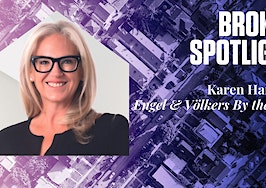- Some industry experts say that limiting brokerages to working exclusively with buyers or sellers is the only way to circumvent fiduciary duty and conflicts of interest.
- Others say that such limitations would be unrealistic, particularly for real estate teams and franchises.
When Hong Kong-based millionaire Hiroshi Horiike toured a home in Los Angeles in late 2007 with Coldwell Banker agent Chris Cortazzo, who was listing the property, nobody on the tour knew that it would eventually result in oral arguments in front of the California Supreme Court.
But that’s what happened earlier this week when lawyers representing Horiike on one side and Coldwell Banker and Cortazzo on the other side told the justices two stories: one involving a breach of fiduciary duty and the other involving a transaction wherein the listing agent mistakenly misrepresented some attributes of the property and the buyer didn’t read everything that he signed.
The nuts and bolts of the case
Horiike claims that because his agent, Chizuko Namba, was an agent in Coldwell Banker’s Beverly Hills office — while Cortazzo operated out of the Malibu West Coldwell Banker office — the brokerage and Cortazzo owed him the same fiduciary duty as Namba.
He claims that Cortazzo and Coldwell Banker violated their fiduciary duty toward him by not clarifying the square footage of the home he was purchasing — fliers advertised 15,000 square feet of living area, but the home’s square footage was actually 11,500.
Horiike filed suit in 2010. Namba, his agent, was not named in the lawsuit.
An appeals court ruling agreed with Horiike, and now it’s up to the California Supreme Court to make a decision that could have major repercussions for how real estate is practiced in the state.
If listing agents owe fiduciary duties to buyers, that could create “a public-policy nightmare for prospective buyers and sellers of California residences,” according to the petition for review filed by Coldwell Banker and Cortazzo’s lawyers.
What could this mean for California real estate?
Possibly nothing — there is a chance that the justices will decide to overturn the appeals court ruling in favor of Horiike (which overturned the original ruling in favor of Cortazzo and Coldwell Banker), and then it will be business as always for agents and brokers in the golden state.
However, if the justices decide to uphold the appeals court ruling in favor of Horiike, then according to the Coldwell Banker/Cortazzo petition for review, the following could happen:
- Buyers and sellers in “intra-firm transactions” would be deprived of the “undivided loyalty of an exclusive agent.” “The salespersons will owe fiduciary duties to parties whose interests inherently conflict,” wrote the attorneys.
- Agents would be forced to disclose “sensitive information about the client’s motivations or the salesperson’s personal beliefs” to the “other side” in the transaction.
- Agents would have to “ferret out sensitive information from, and provide counsel to, complete strangers.”
- The pool of properties available for buyers would be limited.
- Transaction costs would likely go up.
In other words, buyer’s agents and listing agents might have to disclose sensitive information about each other’s clients if they are working under the same brokerage — and some industry insiders also argue that brokerages might feel obligated or compelled to prevent their agents’ buyers from looking at or purchasing homes that are also listed with the brokerage.
“What the plaintiffs here are arguing is that whenever you have a common broker, then both agents need to do the work for both clients,” said June Barlow, vice president and general counsel at California Association of Realtors. “The plaintiff actually said so — the person representing the seller should have gone directly to the buyer and counseled them individually to get everything verified. Can you imagine a buyer being approached by the person who’s working with the seller? Which agent do they listen to?”
One or the other?
While the California Supreme Court justices are making up their minds, there are some steps that agents can take today to ensure they aren’t in a courtroom facing angry clients tomorrow.
Some Inman readers stated that by deciding to represent only one side in the transaction — buyers or sellers, but not both — brokerages could navigate the waters of fiduciary duty more easily.

That’s what Rich Rosa, an attorney and co-founder/co-owner of Buyers Brokers Only in Haverhill, Massachusetts, has been doing from the start; he’s also a member of the National Association of Exclusive Buyer Agents (NAEBA).
“Just in our experience as lawyers, we felt like the industry was very seller-focused; it was all about getting deals done, and the buyers didn’t get a lot of representation,” he said.
He added that he’s never been tempted to incorporate sellers or switch focus. “We like representing homebuyers. We think representing them exclusively is better for them, and we think it’s a better business model.”
“It would be an ideal world if that’s the way the industry went because buyers and sellers are two different animals and they need to be treated differently, and each need their own representation,” said Dawn Rae, president of NAEBA. “But this is not something that the industry wants.”
The issue at heart is who owes the duty to the client: Is it the individual agent, or is it the agent’s brokerage? And if it’s the agent’s brokerage, and both the buyer’s agent and listing agent hang their licenses at the brokerage, how can a conflict of interest possibly be avoided?
“It’s a better situation for a consumer to have an entirely independent buyer agent who doesn’t list property for sale or work at a company that lists property for sale,” said Rosa.
Paul Howard of NJHomeBuyer.com Realty, also a NAEBA member and the broker who left the comment above, agrees.
“You see a lot of teams or even brokerages saying, ‘I’m going to hire a buyer’s agent,'” said Howard. “That’s deceptive in almost every state unless the agency only represents buyers because, as was discussed in this case, the authority flows from the brokerage, and there’s a good reason for that: The brokerage is responsible and has to supervise agents.”
However, other industry experts don’t believe that’s realistic — at all.
“That’s incredibly naive,” said Bernice Ross, a real estate columnist (for Inman and other outlets), speaker, consultant and author. “Part of the problem is that agency is a patchwork — it is so different in every state.”
And then there’s the franchisor piece of the puzzle. “You’ve got Coldwell Banker in Southern California with how many thousands of agents? If your company could only represent a buyer or only represent a seller, you would have to limit the number of agents who could show your property to only agents outside of Coldwell Banker.” That significantly limits the potential pool of buyers and isn’t fair to sellers, Ross noted.
“Each of those [franchise] companies is an individual entity,” said Howard. “Large law firms deal with this issue all the time. Lawyers don’t represent both sides except for in rare cases and then only with disclosure. When they take on a new client, they have to ensure that they don’t have another attorney in their firm representing the opposite side. They have to set up systems to control for that.
“I think a real estate firm should have to do the same thing,” he said.
Rob Hahn, real estate management consultant and author at The Notorious R.O.B., wrote an extensive blog post about the possible repercussions of the case a couple of weeks ago. He agreed that limiting a brokerage’s clients to only buyers or sellers was not a realistic fix for the industry.
What about agents as contractors vs. employees?
“From my standpoint, large brokerages die and the agent team dies if this ruling is upheld — but what we’re missing is that at the heart of this case is the same struggle around 1099,” said Hahn.
That’s a reference to how agents are usually employed by brokerages. Agents are almost always independent contractors — they don’t receive a salary or benefits from their brokerage.
“Most people will say that individual dual agency is terrible — one single agent representing both the buyer and seller,” said Hahn. “But at the brokerage level it’s OK, because the buyer’s agent is representing the buyer’s interest and the listing agent is representing the seller’s interest.”
However, Hahn noted, “if we’re saying that dual agency at the brokerage level is OK, then why have brokers?”
Rosa said that he thinks it’s “absolutely insane” for consumers to agree to dual agency — and he doesn’t believe that designated agency, in which buyer’s agent and listing agent work for the same brokerage, is good for clients, either.
“States that allow designated buyer agency are saying that the brokerage is the dual agent, but the listing agent and the buyer agent do not owe any duties to the opposite client,” he noted. “However, there’s still an inherent conflict of interest in having the same brokerage represent both the buyer and the seller, and it’s also not unusual for buyer agents in a brokerage to receive some sort of incentive when they sell in-house properties — that creates a conflict in and of itself.”
Barlow doesn’t believe that making agents employees instead of independent contractors would solve anything, however.
“I think the brokers would love it if they weren’t responsible for the acts of their independent contractors,” she said. “But that’s really a regulatory issue about supervision.
“The liability might be stronger in an employment situation,” she added, and noted that many real estate agents pursue the career because of the freedom and flexible hours.
Hahn added that in every other situation wherein consumers encounter professionals who have fiduciary duties to them, consumers are directly paying those professionals.
“There is no other area in a typical consumer’s life where the salesperson is working for them,” he said. “I walk into a car dealership, and the salesperson can be super nice — but I know he’s there to sell me a car.”
Of course, who pays for whose agent becomes somewhat of a semantic game when the mortgage is factored in: The buyer is the client securing a mortgage; the mortgage company pays the seller for the home, and then the seller pays each agent.
“The commission is still going to come off the seller’s side of the settlement sheet, because that’s the only way to get the money from the mortgage company,” noted Howard. “But the seller gets the money from the buyer’s mortgage company.”
So what’s next?
Most industry experts don’t see this problem disappearing anytime soon.
The legislative actions taken in British Columbia to crack down on dual agency could happen very easily in the United States, for example, said Hahn.
“When this round of the bubble collapses — last time they went after the bankers,” he noted. “So we set up the Consumer Financial Protection Bureau (CFPB) and spanked the living crap out of mortgage bankers. And they should have, because some of those guys were up to seriously no good.
“This time around when the bubble collapses, who are they going to blame? Are they going to blame themselves? Politicians never blame themselves. Who’s left? You can’t blame the bankers, they are doing everything CFPB told them to do. I think the last major group that’s left to blame are Realtors, and then I think the issue comes to the forefront.”
Hahn points out that the hot market in Vancouver has its own replicas all over the United States — San Francisco, Seattle, Austin. And when the rubber hit the road in Vancouver, the advisory groups “keyed in” to the dual agency issue.
“There’s no way that this market we’re in is natural,” he added. “It’s gonna collapse, and when it collapses, who are they going to blame?”
“I think that having more business models recognized in the law could help,” said Barlow. “This law predates all the other designated agency laws.
“I think it would be a good thing if we revisited the law and converted it to language that people actually use,” she added, noting that consumers might find it confusing that California refers to “listing agents” and “seller’s agents” (the seller’s agent is what most of the industry refers to as a buyer’s agent).
Rosa said that he believes California will tweak its agency laws if the court rules in Horiike’s favor and sees that as the most likely outcome of this case.
Ross also thinks that much hangs on a state’s handling of agency. “You have to follow the letter of your state’s law,” said Ross. “That’s the only defense you have, is that you complied with what your state says you must do.
“If your state has designated agency, then you need to follow your state’s guidelines for explaining it — which tend to be pretty specific — and obtain a signature when you first start working with that client,” she added.
Editor’s note: This story has been updated.













